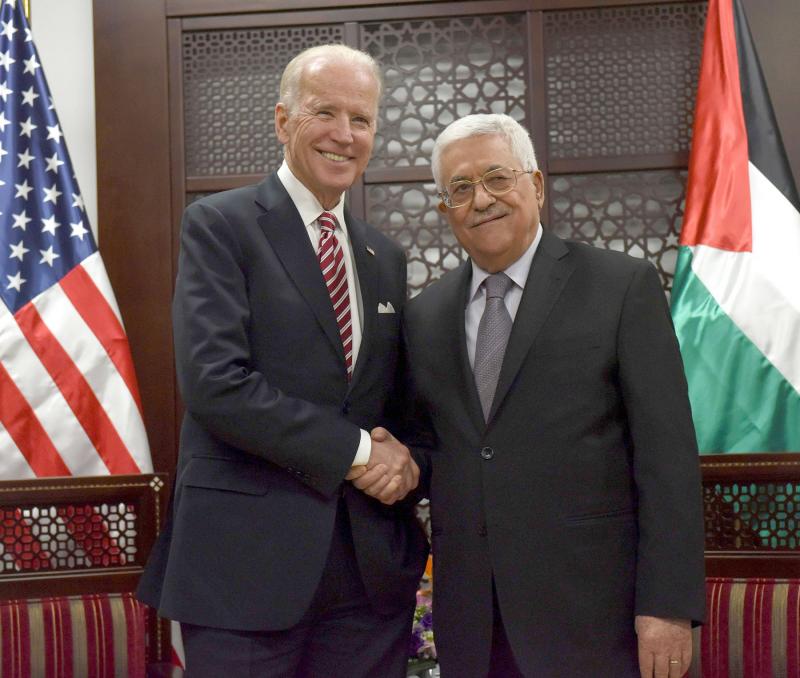Analysis
The PNA opens up to Biden, but the Palestinians don’t trust him
For the Palestinian leadership, the next four years will present exceptional challenges, most importantly concerning the PNA’s own presidency.

Everyone, or almost everyone, applauded the defeat of Donald Trump. Regarding Joe Biden’s victory, however, the Palestinians in the Occupied Territories are divided in their analyses and expectations. The population of the West Bank does not expect major changes from the future administration and hopes that U.S. funding for humanitarian projects and the UN refugee agency, UNRWA, suspended by Trump, will resume. The people of Gaza don’t harbor any illusions: Biden will not take any step to end the Israeli blockade.
Finally, there is the Palestinian National Authority (PNA), which is quietly celebrating, and on Sunday—with President Mahmoud Abbas first and then Prime Minister Mohammed Shtayyeh—made it known that it was ready to restart relations with the United States.
The PNA is putting its hopes on the choices that the future U.S. president will make, after four years of clashes with Donald Trump lined up fully in support of Israeli claims, starting with Jerusalem as the capital of the Jewish state.
Abbas and his entourage are clinging to the promise made by the Vice President-Elect Kamala Harris, in a recent interview with The Arab American News, that the administration would renew ties with the Palestinians and oppose unilateral Israeli moves. Harris also spoke of the reopening of the U.S. consulate in East Jerusalem, a consolation prize for those Palestinians who will not see the American Embassy return in Tel Aviv as they would have liked. However, Biden is in favor of the normalization of relations between Arab countries and Israel, something the Palestinians fought against.
For the Palestinian leadership, the next four years, those in which the new U.S. administration will be in office, will present exceptional challenges. These won’t only arise from the policies of Israel, accompanied by the likely silence from Washington. The most important of these challenges will concern the PNA’s own presidency.
The recent start of full diplomatic relations between the Emirates and Israel has put pressure on the 84-year-old Mahmoud Abbas, and not only because of the weakening of the importance of the Palestinian issue in the Arab world. His rival, Mohammed Dahlan, expelled from the Fatah party, currently in cushy exile in Dubai, who was the first Palestinian representative to congratulate Biden on Saturday, played a role in the normalization agreement.
In the Occupied Territories, they forecast that Dahlan will significantly strengthen his base of support—exploiting rising unemployment and poverty—thanks to funding from the Emirates. Abu Dhabi would certainly be happy with him at the head of the PNA instead of Abbas, who has accused the Gulf monarchy of betraying the Palestinians. In recent weeks, arrests and punitive measures have intensified against pro-Dahlan supporters—who call themselves the reformists of Fatah—in particular in the refugee camp of Amari (Ramallah) and Balata (Nablus), where a former military leader of Fatah, Hatem Abu Razek, who had recently joined the fight against Abbas, was killed in a shooting.
“At the moment, Dahlan has little chance, he does not have a good image among the population,” the analyst Hamada Jaber explains. “However, if Abbas should suddenly leave the scene, he will take advantage of the chaos that the ambitions of well-known figures in Fatah will provoke and play his cards.”
This is why, Jaber adds, “the president should start the transition while in office, calling for elections and following what the Palestinian laws provide. In that case, Dahlan would lack favorable ground on which to act and the rivalries in Fatah would be dampened. But I fear he has no intention of doing so.”
Originally published at https://ilmanifesto.it/lanp-si-apre-a-biden-ma-i-palestinesi-non-si-fidano/ on 2020-11-11
